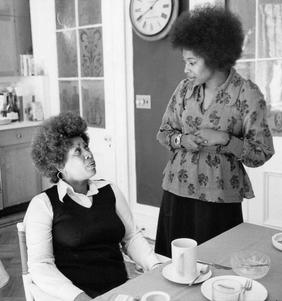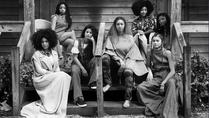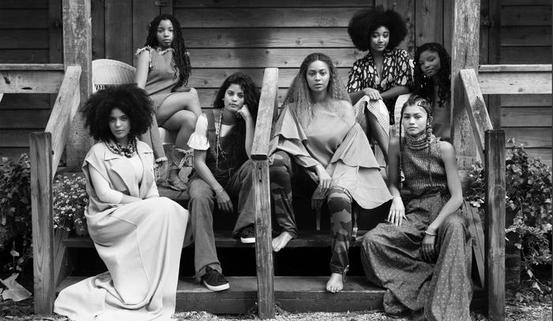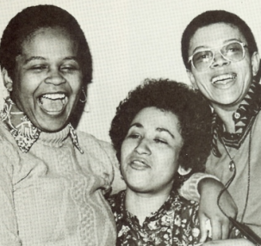Black-Nationalism.com
Greetings. On behalf of Black-Nationalism.com, we wish to extend an invitation to Black Feminists and all LGBTQ activists to participate in a joint on-line dialogue to exchange ideas.
New Black Nationalists believe that the most important change in the Darker Nation's body politic and cultural footprint in the post-Black Power era has been the gender shift empowering Black women and LGBTQ communities. We characterized that shift as the "feminization of the new Black liberation movement." Initially led by left-Black lesbians and feminists in the 60's and 70s, millennial Black feminists, progressive women, LGBTQ advocates, anti-Trump and Neo-Nazis resisters, Black democratic-socialists, and Black Lives Matter supporters have elevated Black feminist thought and influence to dramatically new levels. The implications of this new womens and feminist dynamic that has reconfigured a new Black mainstream is far reaching, both politically and culturally. Accordingly, this dialogue to build comity between our communities and gain a deeper understanding of the issues animating Black Feminists and LGBTQ activists is an engagement about new possibilities.
While the menu of issues among Black Feminists, LGBTQ activists, and Black Nationalists to constructively engage with each other is open-ended, Black-Nationalism.com is particularly interested in exploring the following areas:
1) Black Feminists/LGBTQ priorities and strategies to combat rising attacks on women and women’s rights
2) Black Feminist/LGBTQ theories on Black culture
3) Black Feminism and LGBTQ’s impact on emerging mass movements.
4) Black Feminist theories on nation, nationality and Black identity
As a newly formed network, the central task of our effort is rebuilding the intellectual foundation of Black Nationalist theory. Upgrading our intellectual software with enhancements and new theories exploring our national character, Black culture, and the rationale for creating a nation-state when American Empire collapses is paramount to our nationalist project.
In our view, Black womens rising power in association with the LGTBQ community has and continues to transform the Darker Nation. We are in the midst of a social revolution in which our attitudes of acceptance of Black women leaders, LGTBQ and transgender communities, sex, same-sex marriage, gender equity, and identity issues have dramatically changed.
Visit any Black millennial organization’s website: Black Feminist thought and sensibilities course through their rhetoric and collaborative organizational structures. Black Feminism has tapped into the wellsprings of Black millennial idealism.
Black women are also on the frontiers of the alternative cultural surges of Afrofuturism and Afropunk. Black Feminists and LGBTQ writers and literary critics have chronicled a substantial body of work identifying the constituent elements of our national Black culture.
Since the late 70’s, Black feminists have articulated a compelling body of cultural and aesthetic theory that is illuminating, fresh, irreverent, and controversial. Early Black feminist writers like Barbara Smith's article "Toward a Black Feminist Criticism" anticipated Intersectional Theory.
Black women achieved these advances in the heat of battle against exclusionary white feminists and the white literary establishment. How far has Black Feminist theory come? From an academic perspective, Jennifer Nash in her recent book "Black Feminism Reimagined" provides us with an interesting comparative metric regarding the impact of Intersectionality on the academy. Once ignored by the academy, Nash asserts that "If intersectionality functions as a barometer measuring--and calibrating--the political atmosphere of the U.S. university, I argue that it has been most emphatically called upon to do corrective ecological work in the context of women's studies, and that it is in relationship to academic feminism that intersectionality's institutional life has taken shape." This passage from Nash suggests that while the merits of intersectionality can still be debated, its intellectual impact cannot. Black Feminist scholars and literary critics also engaged in close quarter theoretical combat with venerated literary critics like Henry Louis Gates and Houston Baker, whose bare-knuckled male chauvinism simmering beneath the veil of "post-structuralist" theory was called to book.
Beyond the importance of learning from the Black Feminist experience, Alternative Back Nationalists also seek to heal the breach created by male leaders whose patriarchal abuses of Black women in the Sixties ushered in a period of painful relations between Black women and men.
In the name of upholding the prerogatives of “Black masculinity” during the Black Power era, Black women activists were locked out of leadership positions and pigeonholed into “gendered” roles. Black women resisting sexual abuse and objectification—particularly those infected with the feminist fever--were branded as provocateurs dividing the movement, and worse still, portrayed as traitors to the race.
Rendered invisible by white men, dismissed as irrelevant by white Feminists, slandered by far too many Black “leaders,” and marginalized by the soft indifference of most Black men, Black women--said one Black feminist author--were thought to occupy the lowest status of the human species in America. This state of affairs, led Barbara Smith to say, "There is no political presence that demands a minimal level of consciousness and respect from those who write or talk about our lives."
Those days are over. Black women bolted forward, overcoming great odds. There is no going back to being “the help.” So too, Black men cannot go back to the way things were; nor should they want to. Black Nationalists are also undergoing a changing of the guard. Sixties veterans are giving way to their alternative Fourth Wave Black Nationalist successors anxious to affect a series of course corrections. New Black Nationalists are not "Cultural Nationalists." We are not Pan Africanists. We are not socialists. We are not Black separatists. Simply put, we believe Black people are a historically constituted nation, with a distinct Black culture. We believe Black people are entitled to the right to self-determination. And, we support the creation of an independent Black-majority-led nation on the soil of America's settler state.
As New Black Nationalists, we accept responsibility for our trend's participation and complicity in denigrating and demeaning Black women, feminists and the LGBTQ community. Abandoning Black women when they were under attack from all quarters was a shameful chapter in our history.
That must never happen again. We say this at a time when four Black and Brown U.S. Congresswomen known as “The Squad” find themselves in the crosshairs of the White Nationalists mob. Subjection to the spectacle of a public flogging by the racist authoritarian and sexual predator from Queens has become the order of the day.
The signs that heady and turbulent days lie ahead of us are everywhere. History and the moment are asking us to be different, to do something different, to create and occupy a new public space.
Symbolically and on the substantive matters, this Black Feminist/LGBTQ-Black Nationalist Exchange portends a special moment--one marked by cooperation and tempered reflection. It begins with a spirit of reconciliation and acknowledging difficult truths. Among Black Nationalists, there is “soul work" to be done. Let it begin here.
Black Feminisms' Intersectionality Moment
On The Exchange:
Strategic Disruptions, Afrofuturism & Black Feminism Dr. Cherie Turpin on Academia.edu
Black Lives Matter's Demise NEWBLACKNATIONALISM.COM
The Black Feminist / LGBTQ -- Black Nationalist Exchange
Afrofuturism & Feminism Ytasha Womack on BitchMedia.org
Alice Walker on "Womanism"
From "In Search of My Mother's Garden"
Well, first of all it’s feminist, but it’s feminist from a culture of color. So there’s no attempt to evade the name “feminism,” which is honorable. It actually means womanism – I mean, it’s French in its essence – la femme, so feminism would be womanism.
Womanism comes though from Southern African American culture because when you did something really bold and outrageous and audacious as a little girl, our parents would say, “You’re acting ‘womanish’.
It wasn’t like in white culture where that was weak – it was just the opposite. And so, womanism affirms that whole spectrum of being which includes being outrageous and angry and standing up for yourself, and speaking your word and all of that.
A woman who loves other women, sexually and/or non-sexually. Appreciates and prefers women's culture, women's emotional flexibility (values teas as natural counterbalance of laughter) and women's strength. Sometimes loves individual men, sexually and/or non-sexually. Committed to survival and wholeness of entire people, male and female. Not a separatist, except periodically, for health.
Traditionally universalist as in "Mama, why are we brown, pink, and yellow, and our cousins are white, beige, and black?" Ans: "Well you know the colored race is just like a flower garden, with every color flower represented." Traditionally capable, as in: "Mama, I'm walking to Canada and I'm taking you and a bunch of other slaves with me." Reply: "It wouldn't be the first time."
Loves music. Loves dance. Loves the moon. Loves the spirit. Loves love and food and roundness. Loves struggle. Loves the Folk. Loves herself. Regardless.
Woman is to feminist as purple to lavender.
COMBAHEE RIVER COLLECTIVE
RIVER STATEMENT
Although we are feminists and Lesbians, we feel solidarity with progressive Black men and do not advocate the fractionalization that white women who are separatists demand.
Our situation as Black people necessitates that we have solidarity around the fact of race, which white women of course do not need to have with white men, unless it is their negative solidarity as racial oppressors.
We struggle together with Black men against racism, while we also struggle with Black men about sexism.
We realize that the liberation of all oppressed peoples necessitates the destruction of the political-economic systems of capitalism and imperialism as well as patriarchy.
We are socialists because we believe that work must be organized for the collective benefit of those who do the work and create the products, and not for the profit of the bosses.
Material resources must be equally distributed among those who create these resources. We are not convinced, however, that a socialist revolution that is not also a feminist and anti-racist revolution will guarantee our liberation.
We have arrived at the necessity for developing an understanding of class relationships that takes into account the specific class position of Black women who are generally marginal in the labor force, while at this particular time some of us are temporarily viewed as doubly desirable tokens at white-collar and professional levels.
We need to articulate the real class situation of persons who are not merely raceless, sexless workers, but for whom racial and sexual oppression are significant determinants in their working/economic lives.
Although we are in essential agreement with Marx's theory as it applied to the very specific economic relationships he analyzed, we know that his analysis must be extended further in order for us to understand our specific economic situation as Black women.
Black Feminisms' Intersectionality Moment NEWBLACKNATIONALISM.COM
Stateless Mulattos Against Black Patriarchy NEWBLACKNATIONALISM.COM
Visit AfricanFeminism.com





